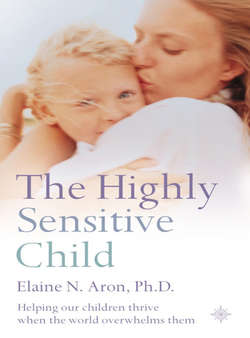Читать книгу The Highly Sensitive Child: Helping our children thrive when the world overwhelms them - Elaine N. Aron, Elaine N. Aron Ph.D. - Страница 16
The Problem of Becoming Easily Overstimulated
ОглавлениеAlthough I could sing the praises of HSCs for many pages, you are reading this book because you need help. Unfortunately, most people—and that includes parents—tend to notice mostly the down side of sensitivity. This is, again, because HSCs are easily bothered by things other children do not notice, and can become totally overwhelmed by a noisy, complex, constantly changing situation, like a classroom or a family reunion, especially if they are in that environment for too long. How could they not be bothered, when they sense so much in every situation? But given the fact that HSCs are in the minority, their reactions and solutions often seem odd to others. Hence all those hints from others, or perhaps suspicions in your own mind, that your child is abnormal.
What are some of the ways in which HSCs try to deal with overstimulation? No child will do all of these, but some will likely be familiar to you. Often HSCs complain a great deal—it’s too hot, too cold, the fabric is too itchy, the food is too spicy, the room smells too weird—things other children would not even notice. And they may choose to play alone, watch quietly from the sidelines, eat only familiar foods, or stay in one room or indoors or in a certain spot outside. They may refuse for a few minutes, hours, days, or even months to speak to adults, strangers, or in class. Or they may avoid “typical, fun kid activities” like summer camp, soccer, parties, or dating.
Some HSCs throw tantrums and have rages to avoid what irritates or overwhelms them or as a reaction to it. Others try to cause no trouble, to be perfectly obedient, hoping no one will notice them or expect more of them. Some stay glued to the computer or read all day, mastering a smaller world. Others will begin to overcompensate for what seems to them to be a flaw, by striving to be stars or perfect.
Some overstimulated HSCs bounce off the walls and seem to have attention deficit disorder, ADD (but their attention is fine when they are not overstimulated and have their priorities straight—more about that later). Or they have “meltdowns,” lying on the floor and screaming. Others become very still and quiet when overstimulated. Some develop stomachaches or headaches—their body’s reaction and also its solution if that means they can go and rest.
Finally, as we will see, some HSCs feel they have tried everything and finally give up. They become afraid and withdrawn and lose hope.
Children can exhibit any of these behaviors for other reasons, and all children can become overstimulated without being HSCs. But too often sensitivity is the last explanation adults think of when children rage, are depressed, bounce off the walls, have stomachaches, or become stressed-out overachievers. It is my hope that, with the publication of this book, people will no longer overlook that possibility. At the end of the chapter I will discuss how to distinguish an overaroused HSC from children who are not sensitive and children with more serious problems.
